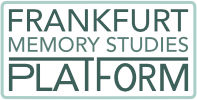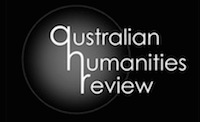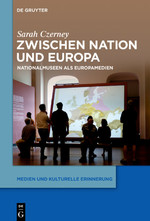Open Access Materials
ReAct Blog (Remembering Activism: The Cultural Memory of Protest in Europe)
 Our aim is to provide the first in-depth account of the remembering and forgetting of civil resistance in Europe which also has relevance for our understanding of movements elsewhere. We will be examining continuities and changes in how protest has been depicted in different media regimes; looking critically at the role of texts, images, and commemorative practices in conveying the memory of protest to later generations; and reflecting on the ways this memory feeds back into later movements at home and abroad.
Our aim is to provide the first in-depth account of the remembering and forgetting of civil resistance in Europe which also has relevance for our understanding of movements elsewhere. We will be examining continuities and changes in how protest has been depicted in different media regimes; looking critically at the role of texts, images, and commemorative practices in conveying the memory of protest to later generations; and reflecting on the ways this memory feeds back into later movements at home and abroad.
Webinar Spaces of Memory, organized by the Elisabeth-Käsemann-Stiftung
 Presenting a key to understanding a nation’s self-concept, and acknowledging the continual and changing discourse on the subject, the digital seminar will discuss different national objectives of investigating, preserving or reconstructing “traumatic spaces” as part of a collective memory, historic culture and democratic development. Furthermore, it shall offer an opportunity to discuss prospects for a “transnational memory” related to traumatic spaces.
Presenting a key to understanding a nation’s self-concept, and acknowledging the continual and changing discourse on the subject, the digital seminar will discuss different national objectives of investigating, preserving or reconstructing “traumatic spaces” as part of a collective memory, historic culture and democratic development. Furthermore, it shall offer an opportunity to discuss prospects for a “transnational memory” related to traumatic spaces.
Speakers: Daniel Rafecas, Elke Gryglewski, Aleid Assmann, Tatjana Louis, Andrzej Kacorzyk and Tomasz Michaldo
Moderator: Astrid Erll
Watch the Video Recording here.
Research Conversations in Memory Studies: IIT Madras Memory Studies Research Network and FMSP
November 24, 2020
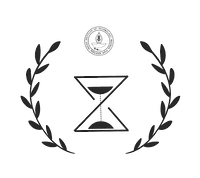
Ms Nishtha Pandey (PhD scholar, IIT Madras), ‘Bearing witness through memory-mapping in Valeria Luiselli’s fiction’
Ms Shiji Mariam Varghese (PhD scholar, IIT Madras), ‘Mapping the Kerala Jewish memory and diaspora through fiction and non-fictional narratives’
Merin Simi Raj (PhD, IIT Bombay), Assistant Professor in English and Faculty Coordinator of Memory Studies Research Network IIT Madras, ‘Memory Studies and the Anglo-Indian Identities’
Avishek Parui (PhD, Durham, UK), Assistant Professor in English and Faculty Coordinator of Memory Studies Research Network IIT Madras, ‘The Fiction of Forgetting: Examining the entanglement of encoding and effacing in fiction’
FMSP Participants:
Nadia Butt (Postdoc, Justus Liebig University Gießen), ‘Memory on the Move’: Rethinking Memory, Mobility and Modernity in the Age of Global Travel’
Astrid Erll (host)
Watch the Video Recording here.
Interviews with Historical Expertise
 The Russian Journal Historical Expertise features interviews with memory studies scholars. Read interviews with
The Russian Journal Historical Expertise features interviews with memory studies scholars. Read interviews with
Marianne Hirsch: “I do believe that personal experience can be the laboratory for research and also for theoretical explanation”
Jeffrey K. Olick “Memory is not a thing, it is not an object. Memory is an ongoing process”
Michael Rothberg: “Understanding Mnemonic Complexity”
Astrid Erll: “Nationalism is a nineteenth-century response to twenty-first century challenges”
Webinar Experiencing and Remembering Cultural Trauma
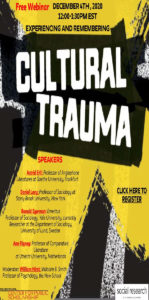 As illness and deaths mount and COVID-19 continues to exact its toll, there is no question that we are experiencing a cultural trauma of enormous magnitude and globality. The time is right for asking: What does it mean for a community as a whole to experience trauma? How does the community represent the trauma, both as it is unfolding and in the future? How will it remember the trauma in the future? How will these memories affect future experiences?
As illness and deaths mount and COVID-19 continues to exact its toll, there is no question that we are experiencing a cultural trauma of enormous magnitude and globality. The time is right for asking: What does it mean for a community as a whole to experience trauma? How does the community represent the trauma, both as it is unfolding and in the future? How will it remember the trauma in the future? How will these memories affect future experiences?
SPEAKERS
Daniel Levy, Professor of Sociology at Stony Brook University, New York
Astrid Erll, Professor of Anglophone Literature at Goethe University, Frankfurt
Ronald Eyerman, Emeritus Professor of Sociology, Yale University, & currently a researcher at the Department of Sociology, University of Lund, Sweden
Ann Rigney, Professor of Comparative Literature at Utrecht University, Netherlands
Moderator: William Hirst, Malcolm B. Smith Professor of Psychology at the New School
“Memory Worlds in Times of Corona” by Astrid Erll
Memory Studies 13.5, 2020: 861-874
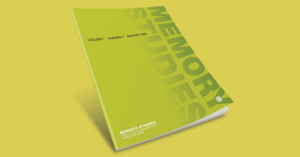 This article addresses the complex temporal and global dynamics of the coronavirus pandemic. After considering some of the new social rhythms that have emerged in the wake of Covid-19 around the world, it turns to the role of collective memory before, during and after corona. The aim is to provide a basic grid for how the Covid-19 pandemic could be addressed using memory studies expertise and concepts such as premediation, memorability, memory (ab)use, national memory, colonial memory, racial stereotypes, the digital archive, generational memory, or Anthropocene time.
This article addresses the complex temporal and global dynamics of the coronavirus pandemic. After considering some of the new social rhythms that have emerged in the wake of Covid-19 around the world, it turns to the role of collective memory before, during and after corona. The aim is to provide a basic grid for how the Covid-19 pandemic could be addressed using memory studies expertise and concepts such as premediation, memorability, memory (ab)use, national memory, colonial memory, racial stereotypes, the digital archive, generational memory, or Anthropocene time.
Access this essay here.
Remembering Activism: The Cultural Memory of Protest in Europe (ReAct)
Our aim is to provide the first in-depth account of the remembering and forgetting of civil resistance in Europe which also has relevance for our understanding of movements elsewhere. We will be examining continuities and changes in how protest has been depicted in different media regimes; looking critically at the role of texts, images, and commemorative practices in conveying the memory of protest to later generations; and reflecting on the ways this memory feeds back into later movements at home and abroad. Visit the website here.
Final Publication of the COST action “In Search of Transcultural Memory in Europe”
A volume called The Twentieth Century in European Memory: Transcultural Mediation and Reception, edited by Tea Sindbæk Andersen (University of Copenhagen) and Barbara Törnquist-Plewa (Lund University), has just been published with Brill (2017). The book investigates contested and divisive memories of conflicts, world wars, dictatorship, genocide and mass killing. Focusing on the questions of transculturality and reception, the book looks at the ways in which such memories are being shared, debated and received by museum workers, artists, politicians and general audiences.
An open-access digital version of the volume can be found here.

The May 2017 issue (47.1) of the Irish University Review with the title Moving Memory: The Dynamics of the Past in Irish Culture features a roundtable with Stef Craps, Astrid Erll, Paula McFetridge, Ann Rigney and Dominic Thorpe (convened by Charlotte McIvor and Emilie Pine) that can be downloaded for free here.
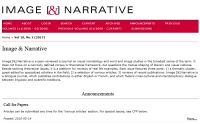
The Belgian-based eJournal Image & Narrative has just published a new issue with the title Audiovisual Memory and the (Re)Making of Europe, co-edited by Astrid Erll and Ann Rigney and featuring contributions by Sébastien Fevry, Silke Arnold-de Simine, Tea Sindbæk Andersen, Dagmar Brunow, and others. Image & Narrative is part of Open Humanities Press, so the articles can be accessed freely. You’ll find the edited issue by clicking here.
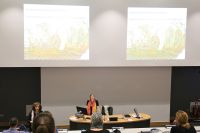
September 2016, Dublin
Listen to the keynote lecture by Astrid Erll (Goethe-University Frankfurt) recorded at ‘In Search of Transcultural Memory in Europe’ conference, UCD, September, 2016. On the website you also find Michael Rothberg’s keynote lecture “Inheritance Trouble – Transcultural Holocaust Memory in the Mirror of Migration” and Francoise Verges’ keynote lecture “Decolonizing Europe – On the Boomerang-Effect of Colonialism, Memory and Dis-Location.”
UCD Humanities Institute Podcast

September 2016, Vienna Humanities Festival, Vienna
Michael Rothberg is the leading Holocaust theorist in the United States and Saul Friedländer’s successor in the prestigious chair in Holocaust studies at UCLA. The pioneer of a post-colonial approach to the Shoah, he has, for example, explored the meaning of the Holocaust for the civil rights movement. His latest research addresses the role of the Holocaust in the lives of Europe’s migrants. What does the memory of the Shoah mean for Turkish-Germans? And what forms of solidarity could exist between Muslim and Jewish communities? In conversation with Wien Museum director Matti Bunzl.
Watch the conversation on youtube
Special section “Scales of Memory”, edited by Rosanne Kennedy and Maria Nugent, in the Australian Humanities Review, Issue 59, April/May 2016.
Days and Memory, blog of the Initiative in Holocaust, Genocide, and Memory Studies, University of Illinois at Urbana-Champaign.
“A Dialogue on the Ethics and Politics of Transcultural Memory – Part I.” – featuring Dirk Moses and Michael Rothberg
“A Dialogue on the Ethics and Politics of Transcultural Memory – Part II.” – featuring Dirk Moses and Michael Rothberg
Article “Museums of Europe: Tangles of Memory, Borders, and Race”, by Chiara de Cesari, published in the journal Museum Anthropology, 7 March 2017.

A short article by Astrid Erll that answers the question “What is collective memory?” for the general reading public was published at spektrum.de in September 2016, and can be downloaded for free here. This text is available in German only.
Online Dictionary: Critical Encyclopedia of Testimony and Memory
The journal Testimony between history and memory has set up an online dictionary with the objective of gathering words from the fields of testimony and memory, following a multilinguistic, multicultural approach in defining the terms. Additions to the encyclopedia are published in new journal issues as well as on the website http://memories-testimony.com. Now online are entries by Astrid Erll on “Transcultural Memory”, Jessica Rapson on “Tourism and Memory”, and Ann Rigney on “Transnational Memory”.
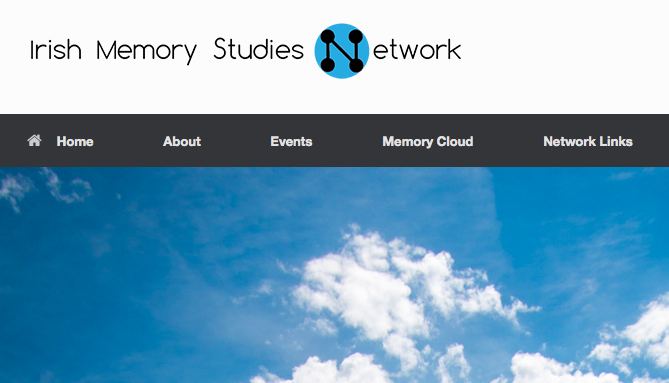
The Irish Memory Studies Network aims to open up a critical dialogue across multidisciplinary aspects of, and international contexts for, memory studies, with a view to generating discussion across disciplinary boundaries and laying the foundations for collaborative research work. These collaborations are made possible through lecture series, workshop events, and conferences. The majority of Network events have been recorded for podcasting and are now available online.
Memory Studies Collection at Goethe University library
Frankfurt University has a special collection of books in the field of interdisciplinary memory studies in its Bibliothekszentrum Geisteswissenschaften.
The shelf mark range is HD 300.740 to HD 300.749.
Click here for a list of the titles in the collection.
Click here for a list of online resources available to users with a library account at Goethe University Frankfurt.

